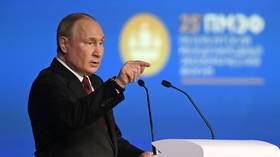New centers of power have emerged, the unipolar world order isn’t coming back, and the colonial way of thinking has failed, says Russian President Vladimir Putin.
The old world is over: Key takeaways from Putin’s first major speech since Russia’s military offensive in Ukraine
by RT Live

The old world order is gone with the wind
WHEN the US declared victory in the Cold War, Americans designated themselves the “messengers of God on earth,” with interests that should be considered sacred and no obligations, Putin told the audience at SPIEF. New centers of power have since emerged, and have the right to protect their own systems, economic models and sovereignty.
These “truly revolutionary, tectonic changes in geopolitics, the global economy, in the technological sphere, in the entire system of international relations,” are “fundamental, pivotal and inexorable,” Putin said. “And It is a mistake to suggest that one can wait out the times of turbulent change and that things will return to normal; that everything will be as it was. It will not.”
Anti-Russian sanctions backfired on the West
When the US and its allies launched the campaign to “cancel” Russia over the conflict in Ukraine, they hoped to crash and undermine the Russian economy and society. The sanctions have instead boomeranged on their creators, aggravating social and economic problems, driving up the cost of food, electricity and fuel, and hurting the quality of life across the West, but especially in Europe.
“The European Union has completely lost its political sovereignty, and its bureaucratic elites are dancing to someone else’s tune, accepting whatever they are told from above, causing harm to their own population and their own economy,” Putin said.
EU citizens will pay the price for “decisions divorced from reality and taken contrary to common sense,” he added, as direct losses from the sanctions alone could exceed $400 billion in a year.
Energy prices and inflation are self-inflicted
Blaming the high energy prices and inflation in the West on Russia – “Putin’s price hike,” as the White House put it – is a “stupidity” and “designed for people who can’t read or write,” the Russian president said.
“Don’t blame us, blame yourselves,” Putin said.
The EU “blindly believing in renewable sources” and abandoning long-term natural gas contracts with Russia led to the spike in energy prices last year, according to the Russian leader. Meanwhile, both the US and the EU addressed the Covid-19 pandemic by printing trillions of dollars and euros.
‘Elite change’ awaits the West
Policies undertaken by EU and US leaders are exacerbating inequalities and divisions in their societies, not just in terms of welfare but in terms of values and orientations of various groups, Putin said.
“Such a detachment from reality, from the demands of society, will inevitably lead to a surge of populism and the growth of radical movements, to serious social and economic changes, to degradation and, in the near future, to a change of elites,” the Russian leader said.
If there’s a famine, it won’t be Russia’s fault
Troubles with food supply have arisen over the past several years – not months – due to the “
“short-sighted actions of those who are accustomed to solving their problems at someone else’s expense,” distorting the trade flows by printing money in a sort of “predatory colonial policy,” Putin said.
Russia is ready to send food to Africa and the Middle East, where the threat of famine is most acute, but faces “logistical, financial, transport” obstacles imposed by the West, he said.
Reasons for the Ukraine conflict
Russia sent troops into Ukraine in February because the West refused to abide by its obligations, and it was “simply impossible to reach any new agreements with them,” Putin said. The decision was “forced, but necessary,” as Russia had every right as a sovereign country to defend its security and protect its citizens and residents of Donbass from “genocide by the Kiev regime and neo-Nazis who received the full protection of the West.”
The West spent years turning Ukraine into an “anti-Russia” state and pumping it with weapons and military advisers, Putin said, pointing out they “did not give a damn” about Ukraine’s economy or the lives of its people, but “spared no expense to create a NATO foothold in the east, directed against Russia, to cultivate aggression, hatred and Russophobia.”
“All the objectives of the special military operation will be unconditionally achieved,” Putin said.
Economic development is an expression of sovereignty
In the 21st century, sovereignty can’t be partial, Putin argued. All of its elements are equally important and complement each other, and the economy is one of them. There are five key principles Russia will follow in economic development: Openness, freedom, social justice, infrastructure, and technological sovereignty.
Russia will “never follow the path of self-isolation and autarky,” but will expand interactions with anyone who wishes to trade, Putin said, adding there are “many such countries.” Moscow will also support private enterprise, build and repair its transportation infrastructure, seek to reduce social inequality, and ensure its key technologies are not dependent on foreign imports.
“Truly sovereign states are always committed to equal partnerships,” while “those who are weak and dependent, as a rule, are busy looking for enemies, planting xenophobia, or finally losing their originality, independence, blindly following the overlord,” he said.